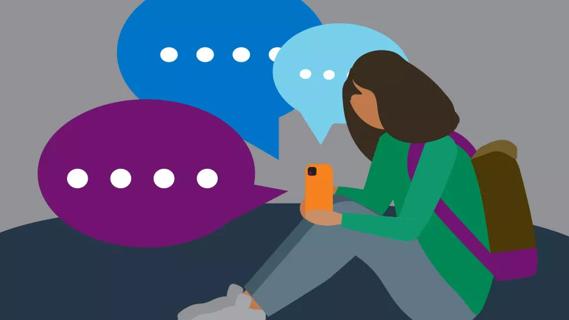‘Stomach gripping’ can lead to muscle weakness, back pain and breathing problems

Have you ever felt a little bit self-conscious about your body and “sucked in” your stomach to try to look thinner? Most of us have, at one time or another.
Advertisement
Cleveland Clinic is a non-profit academic medical center. Advertising on our site helps support our mission. We do not endorse non-Cleveland Clinic products or services. Policy
What you might not realize, though, is that there’s a medical term for this action, and that doing it too often or for too long can have health implications. “Stomach gripping,” as it’s called, can lead to back pain, breathing issues and other concerns.
“Stomach gripping is the process of repeatedly and extensively contracting the muscles of your upper abdomen in order to pull your stomach up and in,” explains chiropractor Adam Browning, DC. “It can alter the movement patterns of your abdominal muscles, which leads to imbalances known as ‘hourglass syndrome.’”
Dr. Browning explains what hourglass syndrome is, how it happens and what you need to know to remedy or avoid it.
Although you might’ve grown up learning that an hourglass is a desirable body shape, don’t be fooled by the name of this condition. Hourglass syndrome isn’t the same as having an hourglass figure — and hourglass syndrome can be both painful and problematic.
“Hourglass syndrome is the result of performing stomach gripping often or for an extended period of time,” Dr. Browning says. “The muscles of the upper abdomen become hypertonic, or tight, and the muscles of the lower abdomen become weak and underused.”
This happens because stomach gripping activates several muscles, including three kinds of abdominal muscles:
Advertisement
“In each case, the muscles you contract increase intraabdominal pressure and push your lungs and stomach contents higher into your rib cage,” Dr. Browning explains.
The more you grip your stomach muscles, the more you train them to malfunction — but you might not even realize you’re doing it.
Stomach gripping can happen for a few different reasons. When you’re in pain, for example, from an injury or after a surgery, you may breathe shallowly to try to protect your core muscles from hurting even more. Most often, though, stomach gripping is something people do for aesthetic reasons.
“You might perform it both consciously and subconsciously to try to achieve a slimmer figure or a flatter stomach,” Dr. Browning says. “It seems to be consistently tied to a perception that flat abs are an indicator of health or athleticism. What starts as a self-conscious or coached behavior to flatten your stomach can become a systematic or chronic behavior carried into adulthood.”
Hourglass syndrome is most common in women, from adolescence into their mid-thirties, but anyone can have it.
Sucking in your stomach every now and then isn’t going to do you any harm, but too much of it can cause problems.
“As with any muscular imbalance, the effects can be far-reaching,” Dr. Browning warns. He walks you through some of the possible implications for your health.
“With stomach gripping, your diaphragm learns to contract in the opposite direction, which can pull the lower ribs up and in, instead of pulling down and creating negative space for the lungs to expand with inhalation,” Dr. Browning explains.
This means that when you suck in your stomach, there’s less room available for your ribs and lungs to expand. And when your lungs don’t have the space they need, the surface area for oxygen transport is limited — and you simply can’t breathe your best.
Ultimately, stomach gripping can reduce your oxygen intake by as much as 30%.
The muscles in your mid and lower back are responsible for supporting your upper body. But when stomach gripping messes with the muscles in your core (abdomen), your neck, shoulders and back pay the price in pain.
“As your body tries to find space for your ribs to expand, your lungs start to press upward instead of down, which can cause neck pain,” Dr. Browning says. “Because of the way your muscles are attached, this upward movement can cause increased structural strain in the mid and lower back, which are anchors for your contracting abdominal muscles.”
Advertisement
Stomach gripping takes place in your abdomen and diaphragm, but it can ultimately also affect your pelvic floor muscles.
“Your soft tissues are weakened by being in a constant state of stretch, without the ability to contract on their own with the same frequency or strength as those in your upper abdomen,” Dr. Browning notes.
A weak pelvic floor can cause urine leakage during everyday activities like laughing, coughing or sneezing.
In addition to the health issues listed above, these physical signs may represent an imbalance in your abdominal muscles:
But you may not see any visible evidence of stomach gripping or hourglass syndrome.

Image content: This image is available to view online.
View image online (https://assets.clevelandclinic.org/transform/3ffa9a08-dd55-49ed-a722-7dcdcbad3909/HE-inline-hour-glass-syndrome-with-labels-800x740-1_jpg)
Beyond noticeable signs, Dr. Browning advises doing a mental inventory of your mentality and practices.
“The easiest way to recognize the condition has to do with recognizing your own motivations and behaviors of the past and looking for muscle imbalances,” he says. “For many people, I think it’s possible to take a moment to reflect honestly and find patterns of the behavior in multiple places.”
Advertisement
Ask yourself whether you tend to:
“Individually, each of these possible identifiers is nonspecific,” Dr. Browning says, “but together they can provide insight into what may or may not be going on.”
Hourglass syndrome is treatable, but it’s not as easy as just “letting it all hang out.” Dr. Browning shares some tips for getting your body back on track if it’s become accustomed to stomach gripping.
Advertisement
Bad habits are hard to break, and stomach gripping is no different, especially when it’s borne of discomfort or discontent with your body. By striving for body positivity or body neutrality, you can learn to love the skin you’re in — and finally, give those abdominal muscles a break.

Sign up for our Health Essentials emails for expert guidance on nutrition, fitness, sleep, skin care and more.
Learn more about our editorial process.
Advertisement

Focusing on non-physical attributes, practicing body positivity or neutrality, and avoiding comparisons can help

This pattern of self-doubt leads you to worry that someone will discover you’re a fraud and that you don’t deserve the success you’ve earned

Obsessively assessing your appearance? Cognitive behavioral therapy and journaling can help you figure out why you’re doing it — and how to stop

It’s a continual process, but through meaningful practices, you can find peace and positivity with yourself

Horoscopes, fortunetellers and personality tests all feed into our cognitive biases and reinforce our own feelings as true

Ignore the negative self-talk, practice positive affirmations and remember, you’re not perfect — and that’s OK!

Foster communication about social media, encourage whole-person attributes and be mindful of your own negative self-talk

Filters and editing can lead to low self-esteem, depression and even body dysmorphic disorder

Even small moments of time outdoors can help reduce stress, boost mood and restore a sense of calm

A correct prescription helps your eyes see clearly — but as natural changes occur, you may need stronger or different eyeglasses

Both are medical emergencies, but they are very distinct events with different causes